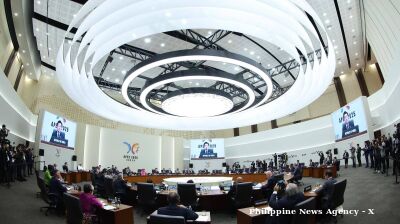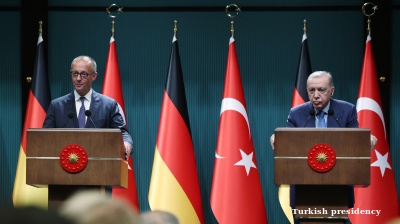Liberal Warsaw Mayor Rafał Trzaskowski and radical right-wing challenger Karol Nawrocki drew tens of thousands of supporters to rival rallies in the capital on May 25, as both candidates sought last-minute momentum ahead of Poland’s presidential run-off this week on June 1.
Nawrocki, backed by the Law and Justice (PiS) party, trailed Trzaskowski – a top figure in Prime Minister Donald Tusk's circle – by just under two percentage points in the first round on May 18, securing 29.5% compared to the mayor’s 31.4%. The run-off was triggered because no candidate managed to secure more than 50% of the vote – a feat achieved only once in the history of Polish presidential elections since 1990.
Polls now show Trzaskowski and Nawrocki are virtually neck and neck, reflecting Poland’s polarised political landscape.
When PiS announced Nawrocki as its presidential candidate, many assumed the election would be an easy win for Trzaskowski, an established politician with tenures as a government minister and Member of the European Parliament.
Trzaskowski has also served as Warsaw mayor since 2018 and narrowly lost his first presidential bid to incumbent Andrzej Duda in 2020.
By contrast, Nawrocki’s experience includes leading the World War Two Museum in Gdańsk, his hometown, and currently heading the Institute of National Remembrance, which investigates Nazi and communist crimes against Poles.
“It’s now or never,” Trzaskowski said during his rally in Warsaw, where an estimated 140,000 people gathered (video), according to unofficial figures from Warsaw police.
“There are places in Poland with good, wise priests, teachers, coaches. But there are places where the only authority is an aggressive football hooligan, a bully who terrorises others at school, who takes sandwiches from classmates and sweets from his sister. But such a person cannot become a president of Poland,” Trzaskowski also said.
His remarks were a clear reference to Nawrocki, who recently admitted to participating in a football hooligans’ brawl in the early 2010s, an incident with organised crime undertones (football hooliganism in Poland has well-documented links to the underworld).
Other controversies from Nawrocki’s past include an alleged takeover of an apartment from an elderly man and, just last weekend, using snus – a dose of nicotine placed on the gum – during a live TV debate with Trzaskowski.
The snus controversy provided fertile ground for the Trzaskowski campaign to attack Nawrocki for nicotine addiction that could hamper his perception powers under pressure as president.
However, polls suggest Nawrocki has largely weathered the snus controversy and other unconventional episodes from his past. His campaign has framed these moments as evidence that he is “one of us,” as opposed to elitist Trzaskowski.
“I’m just like you, I’m one of you,” Nawrocki told his rally, which drew approximately 50,000 people.
“Enough of micromania,” Nawrocki also said, criticising what he described as the Donald Tusk government’s reluctance to pursue ambitious projects.
“Followers of micromania and the shrinking of Poland will not close the political system and one political environment will not rule Poland, because there are us – the citizens of the Polish state,” Nawrocki also said.
The broader context ahead of the June 1 vote is one of unpredictability. Both candidates are trying to court voters who supported far-right candidate Sławomir Mentzen, who secured 15% in the first round.
The far-right’s strong showing, combined with support for anti-EU firebrand Grzegorz Braun, has put pressure on Trzaskowski to expand his appeal without alienating his centrist and left-leaning base – a challenge one newspaper described as “squaring the circle.”
The run-off’s outcome could reshape the future of Prime Minister Donald Tusk’s government. Tusk has struggled to advance reforms due to obstruction from outgoing President Andrzej Duda, a PiS ally.
A Nawrocki victory would enable PiS to continue blocking Tusk’s agenda until the next parliamentary election in 2027, when the party hopes to reclaim power by portraying Tusk as ineffective.
Aware of the stakes, Tusk took to the stage to support Trzaskowski during the rally.
“All of us politicians ... should remind ourselves of this word so rarely spoken by those in power. I apologize. Because you all expected that we would do more, faster, and stronger," Tusk said.
“You are probably also waiting for the word ‘please’, another word rare in politics. Yes, please, I am asking you to give us strength ... so that we can change Poland as we promised,” Tusk also said.
Other leaders of the Tusk-headed ruling coalition also spoke in a show of unity. Romanian president-elect Nicusor Dan also appeared as a live example of a pro-EU politician who has freshly defeated the populist right in CEE's second-biggest country.
"People have chosen honesty, reliability, and respect for the law. These are the values I believe in, and these are the values I see in Rafał Trzaskowski," Dan said.
News

Russia faces $50bn annual losses from oil sanctions as Lukoil exits international assets
Russia is expected to lose at least $50bn annually due to oil-related sanctions, as Moscow’s largest private oil producer Lukoil agrees to sell its international assets and Germany considers nationalising operations owned by state-run Rosneft.

Chicken and chips in Seoul - for Nvidia, Samsung and Hyundai
In a low-key fried chicken shop in southern Seoul, the leaders of Nvidia, Samsung Electronics and Hyundai Motor held an informal meeting on the evening of October 30.

Presidents Lee and Xi begin diplomatic chapter at APEC summit
President Lee, who is chairing the first session of the summit at the Hwabaek International Convention Centre, stood at the entrance to personally welcome participants. President Xi reached the venue at approximately 10:02.

South Korea opens APEC summit focusing on connectivity and growth
South Korean President Lee Jae Myung chaired the opening session of the Asia Pacific Economic Cooperation (APEC) Leaders’ Meeting on the morning of October 31 in Gyeongju, North Gyeongsang Province.




